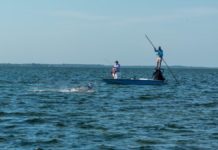A new website developed by the N.C. Geological Survey aims to help Western North Carolina residents understand the dangers they face from landslides. The WNC Landslide Hazard Data Viewer (avl.mx/9sg) compiles current and historical landslide information and displays levels of risk throughout the region.
The interactive map, compiled in partnership with the National Environmental Modeling and Analysis Center at UNC Asheville, currently contains complete data for Buncombe, Henderson, Macon, Polk and Watauga counties. Researchers plan to continue adding information for 14 other counties in WNC.
According to the N.C. Climate Science Report prepared by N.C. State University’s Asheville-based N.C. Institute for Climate Studies and other experts, the area will likely experience more landslides in the coming years due to climate change. Landslides are also included in the highest risk category of the Buncombe Madison Regional Hazard Mitigation Plan approved by the Buncombe County Board of Commissioners on June 15.
Camping, fires banned on Max Patch for two years
In response to issues stemming from significant increases in visitation, the U.S. Forest Service has banned all camping and fires at Max Patch through June 2023. The grassy bald, located on the Appalachian Trail in Madison County near the Tennessee state line, is among the most popular outdoor tourist destinations in Western North Carolina.
“We’ve been working with partners to achieve sustainable recreation at Max Patch,” said Appalachian District Ranger Jen Barnhart in a press release announcing the new restrictions, which went into effect July 1. “Unfortunately, the level of use is causing a public safety hazard, as well as serious damage to wildlife habitat.”
Other rules now in force at Max Patch include limiting groups to 10 people, requiring dogs to stay on a leash no longer than 6 feet and closing several user-created trails. More information and a map of the area in which the restrictions apply are available at avl.mx/9se.
Blue Ridge Parkway tops national parks in 2020 visits, spending
Step aside, Golden Gate Bridge: In 2020, the Blue Ridge Parkway overtook the land surrounding the California landmark as the most-visited attraction managed by the National Park Service. According to recently published NPS data, the parkway hosted roughly 14.1 million recreational visits last year, while the Golden Gate National Recreation Area saw about 12.4 million visits.
The parkway, which runs through Asheville before heading northeast to Virginia, also topped the list in terms of visitor spending, accounting for about $1.07 billion in lodging, restaurant sales and other economic activity. Of that spending, the NPS estimates that about 95% comes from nonlocal visitors to the parkway, and roughly 62% takes place within North Carolina.
Both visitation and spending along the parkway saw smaller decreases due to the COVID-19 pandemic compared with trends observed for other NPS attractions. While those numbers were down 27.7% and 30.7%, respectively, across the park system, the parkway’s visitation and spending were down less than 5.9% and 5.2%.
In the wild
- In 2020, North Carolina saw its highest tally of black bears killed during a single hunting season. According to the N.C. Wildlife Resources Commission, 3,748 bears were hunted across the state; the Mountain Bear Management Unit, which includes WNC, accounted for 1,429 of that total, the unit’s second-highest harvest on record. Colleen Olfenbuttel, the NCWRC’s black bear and furbearer biologist, said the increase in hunting activity was likely tied to an overall greater interest in the outdoors driven by the COVID-19 pandemic.
- Due to continued declines in the wild American ginseng populations of the Nantahala and Pisgah national forests, the U.S. Forest Service will not issue harvest permits for the plant this year. Any removal of wild ginseng from national forest land is subject to a fine of up to $5,000 and/or a six-month federal prison sentence.
- On July 1, a coalition of environmental organizations filed a lawsuit seeking to overturn the U.S. Fish and Wildlife Service’s April 2019 denial of endangered species status to the eastern hellbender. As previously reported by Xpress (see “Slipping away?” Jan. 23, 2019, avl.mx/9sh), the giant salamander, a flagship species for WNC, faces challenges from habitat loss and climate change.
Community kudos
- Bob Carswell, the CEO of Morganton-based textile recycling company Material Return, was named one of 14 inaugural fellows by the Fund for New Leadership. Carswell will receive coaching and $225,000 in unrestricted funds over three years to build his business, which gathers WNC textile waste for use in new products.
- The Foothills Conservancy of North Carolina received a 222-acre land donation in the Thermal City area of Rutherford County. Owners David and Martha Cameron plan to bequeath another 101 acres in their will, with the hope that the entire tract of mostly undeveloped forest will become a public park.
- Buncombe County has started construction on a roughly $10 million collection of solar panels on county facilities and area schools approved by the Board of Commissioners last July. Fairview Library is the first of 39 buildings to be outfitted; the project is expected to take about 18 months to complete.
Save the date
-
TAKE A WALK: Conserving Carolina communications intern Alexla Perez-Sanchez leads a series of bilingual nature excursions over the next three months. Photo courtesy of Conserving Carolina Solarize Asheville-Buncombe raises funds for its Neighbor to Neighbor Solar grant program at the Hi-Wire Brewing Big Top 5-8 p.m. Thursday, July 15. The program helps low- and moderate-income residents afford solar power; Solarize hopes to raise $200,000 to assist 30 local families. More information is at avl.mx/9ws.
- Hendersonville-based nonprofit Conserving Carolina hosts a series of bilingual Spanish/English nature walks led by Alexla Perez-Sanchez, the organization’s communications intern and a rising UNC Asheville senior. Outings include the Park at Flat Rock at 9 a.m. Saturday, July 17; the Brevard Greenway at 9 a.m. Saturday, Aug. 14; and the Vaughn Creek Greenway at 9 a.m. Saturday, Sept. 11. Registration is required at avl.mx/9sa.
- N.C. Cooperative Extension’s Buncombe County Center hosts a webinar on local climate change mitigation and adaptation at 6 p.m. Wednesday, July 21. The talk features Kathie Dello, director of the N.C. State Climate Office. More information and registration are at avl.mx/9so.
- The Pisgah Center for Wildlife Education in Pisgah Forest, managed by the NCWRC, holds a fly-fishing expo 10 a.m.-3 p.m. Wednesday, July 21. No registration is required to take part in hands-on fishing activities such as tying flies and casting practice. More information is at avl.mx/9sc.
Credit: Source link






























